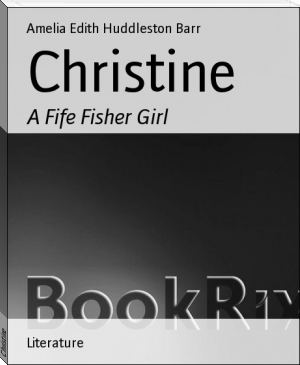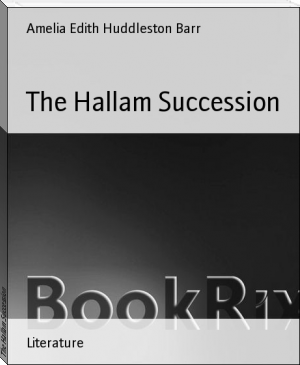Christine, Amelia Edith Huddleston Barr [chromebook ebook reader txt] 📗

- Author: Amelia Edith Huddleston Barr
Book online «Christine, Amelia Edith Huddleston Barr [chromebook ebook reader txt] 📗». Author Amelia Edith Huddleston Barr
Margot had insisted on a visit to her special shed, to see whether all was in readiness for her special labor, but Christine had entreated her to wait for her return from the town, where she was going for orders. She had left her mother with the clear understanding that she would not risk the walk and the chatter and the clatter until the following day. But as soon as she was alone, Margot changed her intentions. "I must make the effort," she said to herself. "I'm feared of the pain, that's all about it." So she made the effort, and found out that there was something more than fear to be reckoned with.
Christine brought home astonishing orders, and Margot's face flushed with pride and energy. "I'll not let that order slip through my fingers," she cried, "I'm going to the kippering, and what I canna do, Christine can manage, following my say-so."
This change in Margot's work was the only shadow on that year's herring-tide. It was a change, however, that all felt would not be removed. Margot said, with a little laugh, that she was teaching her lassie how to make a living, or how to help some gudeman to do it. "And I have a fine scholar," she soon began to add. "Christine can now kipper a herring as weel as her mother, and why not? She has seen the kippering done, ever since she wore ankle tights."
"And you will be glad of a bit rest to yourself, Margot, no doubt," was the general answer.
"Ay, I have turned the corner of womanhood, and I'm wearing away down the hillside of life. I hae been in a dowie and desponding condition for a year or mair."
"Christine is clever with business, and folks do say she has a full sense of the value of money."
"To be sure, Nancy. There's no harm in the like of that. Her feyther came from Aberdeen folk, and it's weel recognized that Aberdeen folk look at both sides of a penny."
"Christine is a clever lass, and good likewise, we were all saying that, a while ago."
"Weel, some folk, out of bad taste, or a natural want of good sense, may think different; but there--that's enough on the subject of Christine. Her feyther is gey touchy anent Christine, and it will be as weel to let that subject alone."
So, day after day, Margot sat in a chair at her daughter's side, and Christine filled the big orders as her mother instructed her. And they were well filled, in good time, and the outcome was beyond all expectation. Yet Christine looked sadly at the money, and Margot turned her head away, to hide the unbidden tears in her eyes, as she said:
"It's all yours, lassie. I'll not touch a farthing of it. You have fairly won it. It will happen help Neil's deficiencies. Oh, my dear lassie! Mither has done her last kippering! I feel it."
"Then I'll kipper for you, Mither, as long as we both live. The hill is now o'er much for you--and the noisy women, and skirling bairns! Christine will go to Mother's shed, and Mother will bide at hame, and red up the house, and have a cup of tea ready for hungry folk, as they come weary hame."
And Margot let it go at that, but she was as she said, "dowie and despondent." Ruleson begged her to go with him to Edinburgh, and get the advice of a good physician, but Margot would not listen to any entreaty.
"I'll no do any such thing," she answered. "Not likely! The Domine can gie the pain a setback, and if God wants me here, He'll keep me here, sick or well, and if He doesna want me here, I'm willing to go where He does want me." From this position Margot was not movable, and now that the herring fishing was over, there did not appear to be any reason for making her restless and unhappy. So she naturally drifted into that household position, where everyone took care not to tire, and not to vex, grandmother.
One morning in the early days of October, Christine was sitting sewing, and Margot was making shortcake. They had been talking of Neil and wondering where he was.
"I'm thinking it is whole o' a month, since we heard from the lad," said Margot.
"I dare say it's mair, Mother; and that letter was from some strange French seaside place, and he was thinking that they wouldna stay there very long. He has mebbe gane further awa' than France."
"I wouldn't wonder--setting a young man traveling is like setting a ball rolling down a hill. Baith o' them are hard to turn back."
Margot had scarcely finished speaking, when Sam Brodie opened the door. He had been to the town post office and seen, in the list of uncalled-for letters, a letter addressed to Christine, so he had brought it along. It proved to be from Neil, and had been posted in Rome. Christine was familiar with that postmark, and it still had power at least to raise her curiosity. Neil's handwriting, however, spoke for itself, and before she broke the seal, she said, "Why, Mither! It is from Neil."
"I thought that, as soon as Sam came in. I was dreaming of a letter from Neil, last night. I dinna dream for naething. Make haste with the news--good or bad--read it all. I want to hear the warst of it." Then Christine read aloud the following letter:
DEAR CHRISTINE,
I want you to tell Mother that I married Miss Rath in Paris on the
fifth of September ult. We were afraid that Reginald was going to
interfere, so we settled the matter to prevent quarreling--which,
you know, is against my nature. Reginald's opposition was quite
unlooked for and, I must say, very ill-natured and discouraging.
If there is anything in a man's life he should have full liberty
and sympathy in, it is his marriage. I dare say Mother will have
some complaint or other to make. You must talk to her, until she
sees things reasonably. We were married in the Protestant
Episcopal Church in Paris, very quietly--only the necessary
witnesses--and came on here at once. I disapproved so highly of
Reginald's behavior at this important period of my life, and of
some insulting things he said to me, that I have resolved not to
have any more relations with him. After all I have done for him,
it is most disheartening. My wife feels her brother's conduct very
much, but she has perfect trust in me. Of course, if I had been
married in Scotland, I would have had my friends' presence, but I
am quite sure that my best interests demanded an immediate
marriage. We shall be home in a month, and then I propose to open
a law office in Glasgow _in my own name_. I shall do better
without impedimenta like Reginald Rath. I trust to you to make all
comfortable at home. I shall desire to bring my wife to see my
mother. I am proud of Roberta. She is stylish, and has a good deal
more money than I expected. I shall not require Reginald's money
or patronage, they would now be offensive to my sense of honor and
freedom. Give my love to my father and mother, and remember I am
Always your loving brother,
NEIL.
There was a few moments' dead silence, and Christine did not lift her eyes from the paper in her hand, until a passionate exclamation from Margot demanded her notice.
"Oh, Mither, Mither!" she cried, "dinna mak' yoursel' sick; it's Neil, our Neil, that you are calling a scoundrel."
"And I'll call a scoundrel by no ither name. It's gude enough for him."
"We were talking one hour ago about him marrying Miss Rath, and you took to the idea then. Now that he has done so, what for are you railing at him?"
"I'm not railing at him for marrying the lass, she's doubtless better than he deserves. It's the way that he's done the business--the mean, blackguardly way he's done the business, that shames and angers me. Dod! I would strike him on the face, if he was near my hand. I'm shamed o' him! He's a black disgrace to his father and mother, and to all the kind he came from."
"Generally speaking, Mother, folks would say that Neil had done weel to himsel' and praise him for it."
"Who are you alluding to? Dinna call the name 'Neil' in my hearing. Scoundrel is gude enough to specify a scoundrel. I hae counts against him, and he must clear himself, before I'll pass his christened name o'er my lips."
"What are your counts against him? Maybe I can speak a word to explain them."
"Not you! First, he has, beyond a' doubt, deceived the lass's brother. He should hae spoken to him first of all, and the young man wouldna hae said insulting words if there wasna cause for the same."
"The lady was of full age, and sae had the right to please herself, Mither."
"She had not. She was as bad as Neil, or she would have sought her brother's consent."
"Perhaps Neil wouldna let her tell her brither."
"That's like enough. He has got the girl, and that means he has got full control o' her money. Then he breaks his promise to go into partnership in business with the brother, and will open a law office in his ain name! He'll open it, ye ken, wi' the Rath siller, in his ain name! Having got plenty o' the Rath siller to set himsel' up, he drops the man whom he used to fleech and flatter enou' to sicken a honest man. And he trusts to you to mak' all comfortable here--but no word or whisper anent the ninety pounds he's owing you. He has gotten mair money than he expectit wi' his stolen wife, and yet he hasna a thought for the sister wha emptied the small savings o' her lifetime into his unthankfu' hands. Wae's me, but I'm the sorrowfu' mither this day."
"For a' that, Mither, dinna mak' yoursel' sick. Luck o' some kind threw the Rath siller in Neil's way."
"Ay, and the scoundrel has ta'en all he could get o' it."
"That's the way o' the warld, Mother."
"It isn't the way o' honest, honorable men. He ought to hae spoken to the young man plainly, and he ought not to hae quarreled wi' him anent their business proposal. I understand that the Rath lad was na very knowing in the law nor indeed notable for managing his ain affairs, in any way."
"Weel, Mither, it comes to this--Neil had made up his mind to tak' his living out o' the Rath purse, and he finally decided that he would rayther tak' it from the lady, than the gentleman."
Margot laughed at this remark. "You'll not be far wrang in that observe, Christine," she said, "but the lad may be far out o' his





Comments (0)